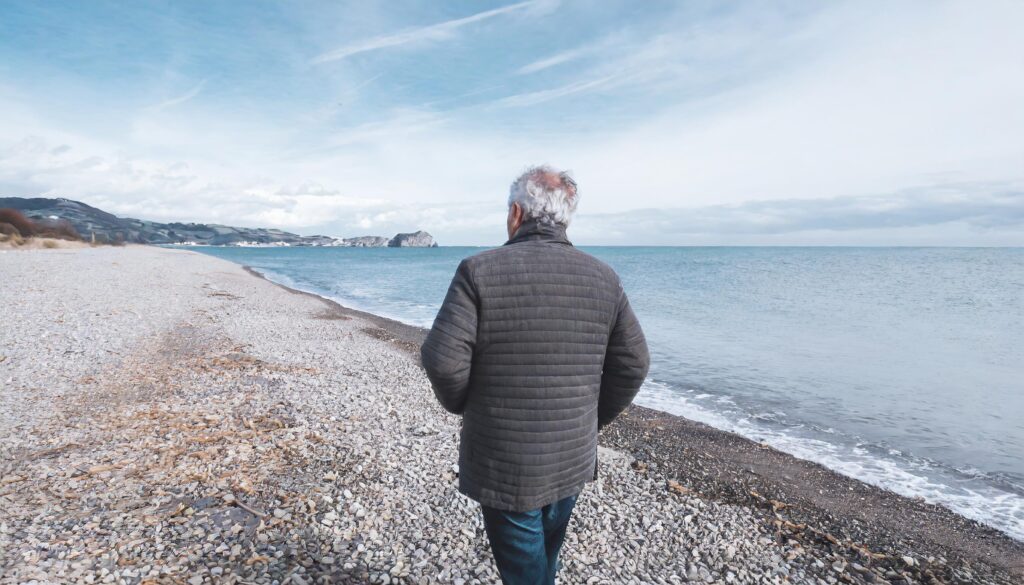The Walker
Many years ago on a lonely road a man went walking and as he walked, he thought about the meaning of life.
He came from the east and he walked with a determined firm intent.
As he trod the ancient towpath by the sea where the ocean roared and huge waves crashed on to the cliff face, he smiled when he noticed the tower of a lighthouse.
In times past that lighthouse had brought comfort to sailors but to those on the slave ships it displayed fear and dread. These thoughts the walking man knew but the knowing of them was a burden to him. He had seen the way of it all and had forsook the pain of reason. And so he walked on: through the silent meadows, through the manic towns, down the winding country lanes on to the trails of no speaking where so many faceless travelers had gone before. He walked through the day but the day brought no comfort, and so he walked on.
The dusk of many evenings came and went and the long nights seeped into his soul. He hid in the haylofts slept in the haystacks. He worked the rich mans harvest through long summer. He worked until the longing aching for the freedom of the road took him back.
He walked past the mountains and riversides, he walked through the woods and he delighted in the habitable parts of the earth. The days became a collage of dreams; the night was heavy and restless. One day while walking he approached a high wall by a viaduct that carried trains, the word “Why” was painted in gigantic letters on that wall. The man stopped walking………………
He heard the trains rattling across the viaduct. He heard the excited sound of children’s voices. The walking man became very ill.
Some kindly people from the village took him in and tried to care for him but his fever was very high. While he lay helpless in this house of unknown friends he became terrified of sleep because sleep brought him reason and thought.
In this paroxysm of fear he stayed for a long time and began to fade from this life.
He would listen as the trains past over the viaduct his heart would beat like the piston of a great engine at the sound of the thundering wheels and steam tumult.
Each train seemed to get louder and louder. The mighty rolling of iron on rails was madding to his ears. One night he heard the faint sound of a fast train approaching, louder and louder it got. The rattling thunderous shaking of the ground, the ornaments falling of the shelves in the house of unknown friends. As the train came exploding its pumping pistons its mighty tyrant guns of rage the walker put his hands over his ears: ‘Please tell me why he screamed?’ he fell asleep at that very moment.
When he awoke the child of a signalman was standing beside him with a poem about people on trains. The child said: “How many ears must a man have?”
The walker replied ‘How many do you need?’ The child said ‘ I’ve got two I’ll lend you one if you want!’ Someone knocked on the door, the roof began to leak and the circus came to the village. The child said ‘do you want this or not?’
‘Where does it come from?’ the walker replied. ‘From the age of never and the house of nowhere’ the child replied. ‘Read it to me, for mercies sake read it to me!’ the walker said. And this is what the child read out, for absolutely no reason…….
The second-class passenger:
On the platforms all our lives waiting for the train
It always comes on time for us to stations with no name
We sit with vacant faces
That cry for recognition
We move in twilight shadows
Hopeless repetition
To wait upon your world
To wash your hands and feet
To listen while you tell us
‘There is no untouched elite’
But we have tasted, felt and seen
so much that you don’t know
We are the thunderstorm
That creates your ‘Lovely rainbow’
Will you ever hear us that cry out from the earth?
Did you hear us in the stable when or darkness famed His birth?
Do you ever listen to hear the silent pains?
Or do you put it all down to just the sounds of…………..trains?
Soon after hearing this poem the walker rose from his sick bed restored to health. He was amazed that he did not have to think nor could he remember thinking about getting well. It was as if it had all been done for him. The walker went back to the road unburdened knowing everything.
(by Chris Pitts)


I enjoyed reading this. It reminded me of The Pilgrim’s Regress by C. S. Lewis, which I recommend.